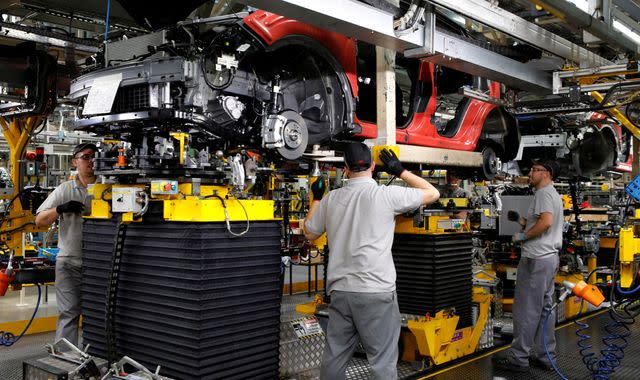UK's desperation can be exploited as it can't compete with £100bns spent by the US and EU

If you are willing to invest in Britain you should expect government support.
Make it £2bn announced in the week of a major fiscal event, as Nissan did on Friday, and you get the prime minister and chancellor of the exchequer showing their gratitude with a shift on the production line.
The sight of Rishi Sunak and Jeremy Hunt fitting a badge to the front of a Qashqai was a sign this investment means almost as much to the two key workers in Downing Street as it does to Nissan's 7,000 UK staff.
Britain's best-selling car might be the sort of vehicle Mr Sunak only borrows for photo shoots, but the construction of a new gigafactory in Sunderland means that, should the need arise, he'll still be able to pose with one when they are all-electric.
Battery powered successors to the Qashqai and the Juke, as well as the already all-electric Leaf, will now be made in Sunderland, a commitment that should see Britain's largest car plant into a second half century of production.
The taxpayer will kick in around £100m of the £1.12bn Nissan has committed to vehicle production, with further incentives likely to be part of the £900m cost of the battery plant and construction of a renewable energy 'microgrid".
For a prime minister struggling to prove he has a plan to replace the industrial strategy he tore up when he came to office, it was a good end to another challenging week.
From the cancellation of the northern leg of HS2 to his five-year delay to the ban on new petrol and diesel cars, Mr Sunak's backtracking has left industry and investors privately questioning the UK's reliability.
In response Mr Sunak can now point to up to £1bn spent on securing long-term commitments from major manufacturers.
Indian conglomerate Tata, owner of Jaguar Land Rover, has done particularly well, receiving £500m to support its £4bn gigafactory in Somerset and several hundred more to transition to green steel production at its Port Talbot plant.
BMW got around £75m towards its £600m investment in building the electric Mini at Oxford Cowley, albeit with imported batteries, and Stellantis, owner of Peugeot, Citroen and Fiat, will make electric minivans at Ellesmere Port.
With Honda having closed its Swindon plant after Brexit, that leaves only Toyota of Britain's existing manufacturers yet to commit to electrification in the UK, and that may change in the coming months.
There are still questions the prime minister, chancellor and business secretary Kemi Badenoch, a noted opponent of any strategy that smells of state intervention, need to address.
Is the current pattern of doling out subsidies (which they all claim to oppose) an efficient or cost-effective way of leveraging taxpayer funding?
With the US and EU planning to spend hundreds of billions on attracting industry the UK cannot compete on scale, but every pound matters and desperation can be exploited.
And what of the role of China in battery production?
Nissan's new factory will likely be built by its partner AESC, owned by Envision, which may prove to be one of those Chinese companies with which the UK government cannot afford to have a problem.


